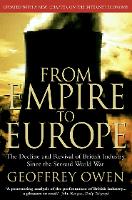


|
|
| book details |
From Empire to Europe: The Decline and Revival of British Industry Since the Second World War
By (author) Geoffrey Owen

|
| on special |
normal price: R 360.95
Price: R 342.95
|
| book description |
Renowned industrial expert Geoffrey Owen analyses the complex reasons behind the delayed modernisation of British industry. In 1945, following the economic hardship of the war years, British industry looked forward with confidence to re-establishing links with its traditional trading partners in the Empire, and in the years of reconstruction which followed enjoyed unprecendented growth and prosperity. But the emergence of an economically vigorous and fiercely competitive Europe forced Britain to come to terms with some fundamental industrial weaknesses and to question where her economic destiny lay as the ‘miracle economies’ of France and Germany began to overtake her own. Through case studies of key industries from textiles to pharmaceuticals, steel to electronics, Owen offers a vivid account of Britain’s industrial progress, and argues that since the late 1970s British industry has undergone a painful but necessary transformation which has rapidly modernised the UK economy. At the start of a new millennium, as Britain once again debates its relationship with an ever more unified Europe, Geoffrey Owen provides a timely appraisal of the often troubled path that Britain has taken from Empire to Europe.
| product details |

Normally shipped |
Publisher | HarperCollins Publishers
Published date | 20 Nov 2000
Language |
Format | Paperback / softback
Pages | 544
Dimensions | 198 x 129 x 30mm (L x W x H)
Weight | 381g
ISBN | 978-0-0063-8750-3
Readership Age |
BISAC | history / europe / great britain
| other options |

Normally shipped |
Readership Age |
Normal Price | R 470.95
Price | R 447.95
| on special |
|
|
|
To view the items in your trolley please sign in.
| sign in |
|
|
|
| specials |
|

|
Mason Coile
Paperback / softback
224 pages
was: R 520.95
now: R 468.95
|
A terrifying locked-room mystery set in a remote outpost on Mars.
|
|
|
An epic love story with the pulse of a thriller that asks: what would you risk for a second chance at first love?
|
|
|
|